11/06/2017
Baby Samurai goes to school
What an ordeal, sending your baby (yes baby) to school in Indian megacities...
 Since my son crossed the fateful (it seems) 15 months threshold, the first question I am asked is: “so, he is going to school?” That said, I have a feeling that this obsession with schooling is specific to the people of my residential society, because I was actually told, by the founder of a crèche chain, that in India parents are reluctant to send their children to school before 3 years. During these first years, the child is considered as an extension of his parents, a small animal that needs to be fed, changed and put to sleep – it covers his primary needs without caring for his or her own personality, nor any concern about his/her ‘development’. I must say that with extended families, kids naturally ‘socialise’, hence it is a non-issue. This lady has met is on a mission: explaining to Indian parents (especially those who are working and those who live in smaller families) the concepts of socialization etc. Apparently his sermon reached very well the ears of my neighbours, since all these rich people, exposed to Western culture, look at you like a monster if you don’t put your little one in school very early.
Since my son crossed the fateful (it seems) 15 months threshold, the first question I am asked is: “so, he is going to school?” That said, I have a feeling that this obsession with schooling is specific to the people of my residential society, because I was actually told, by the founder of a crèche chain, that in India parents are reluctant to send their children to school before 3 years. During these first years, the child is considered as an extension of his parents, a small animal that needs to be fed, changed and put to sleep – it covers his primary needs without caring for his or her own personality, nor any concern about his/her ‘development’. I must say that with extended families, kids naturally ‘socialise’, hence it is a non-issue. This lady has met is on a mission: explaining to Indian parents (especially those who are working and those who live in smaller families) the concepts of socialization etc. Apparently his sermon reached very well the ears of my neighbours, since all these rich people, exposed to Western culture, look at you like a monster if you don’t put your little one in school very early.
Except that I decided to not let that deter me, and to think for myself, puting things in perspective. In France, for example, crèche is rarely a choice, but a requirement due to the professional activity of the parents and the unavailability of the grandparents who enjoy their retirement and are not willing to get back to full time parenting with a baby. From there, one can find benefits to crèches of course, but a child cannot play with other children until at least 2 years, or even more. Before that he builds his individuality and has no place for this kind of interaction with other humans of his age. I hadn't read anything beforehand, simply trusting to my intuitions, but literature quite agrees with my state of mind. And me, I have had a great nanny, a great house with a park equipped with children at the end of my garden, so I never saw the need to impose car rides (traffic jams) and early schooling to my boy. And monetary considerations were not even considered in this decision, but they could have, since a year in a ‘good’ crèche and/or pre-school costs almost minimum 2000 euros... So I took the risk of being perceived as a bad mother, what do I care?
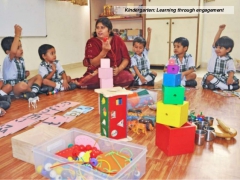 That said, I’m always open to suggestions and able to challenge myself enough, so I did try two local crèches which had a ‘mother-child’ program, when my son was 15 months. I also took my nanny along. After 3 hours, in both the centres, we left with a bad headache. I had expected playing and fun; I landed up in hell, one has no idea how noisy teachers can be. And they sing and they scream, activities one after the other at a crazy speed, not a moment’s inattention permitted to the children: don’t look away, ‘U for umbrella’. They disgusted me. And comforted me in my low opinion of Indian schools which give an exaggerated importance to the kids’ development and academic learning. My baby would have to wait 18 years before going to school! (Or at least 3 years ;) ).
That said, I’m always open to suggestions and able to challenge myself enough, so I did try two local crèches which had a ‘mother-child’ program, when my son was 15 months. I also took my nanny along. After 3 hours, in both the centres, we left with a bad headache. I had expected playing and fun; I landed up in hell, one has no idea how noisy teachers can be. And they sing and they scream, activities one after the other at a crazy speed, not a moment’s inattention permitted to the children: don’t look away, ‘U for umbrella’. They disgusted me. And comforted me in my low opinion of Indian schools which give an exaggerated importance to the kids’ development and academic learning. My baby would have to wait 18 years before going to school! (Or at least 3 years ;) ).
My neighbor, the one I would have liked to become friend with, that I looked up to as an example and to whom I had asked advice when we moved in, lost a lot of points for insisting so much that I put my son in one of these schools where her daughter goes, poor kid.
Except that. My nanny started acting funny. Knowing very well that it would be really tough to find a gem like her, I preferred to look for school options, earlier than I had planned. I selected 4. A Swedish one – but I had to cross it off my list because they don’t take children before 3 years and half (actually my son would be almost 4 and half before being admitted, as children need to be 30 months in April and not a week later), one between home and office and 2 Montessori schools. Montessori was recommended to me by a friend. But beware, in Gurgaon, almost all the schools are named ‘International Montessori Schools’ – even if they are very much Indian and adopt only a few Montessori concepts. Anyway, the site of the Montessori Foundation gave me the name of the only two schools accredited in Gurgaon (not one in Delhi!)..
find a gem like her, I preferred to look for school options, earlier than I had planned. I selected 4. A Swedish one – but I had to cross it off my list because they don’t take children before 3 years and half (actually my son would be almost 4 and half before being admitted, as children need to be 30 months in April and not a week later), one between home and office and 2 Montessori schools. Montessori was recommended to me by a friend. But beware, in Gurgaon, almost all the schools are named ‘International Montessori Schools’ – even if they are very much Indian and adopt only a few Montessori concepts. Anyway, the site of the Montessori Foundation gave me the name of the only two schools accredited in Gurgaon (not one in Delhi!)..
We were first to meet between a ‘normal’ school. For that, we had to take an appointment and visit outside the school hours, carrying a checkbook (the visit is not free and seats go fast, so if you like it, it is better to register on the spot, the secretary said) and a completely convoluted questionnaire – the question “kids love pleasing their parents; can you give us an example?” made me rack my brain, in vain, and after a few hours, my husband could come up with something... My child is amazing, but up till 2 (and even now, most of the time), he couldn’t give a dam about my well-being, let me be honest. And right after we had to go see the Montessori school which had answered my mail. I didn't like the name, ProductiveMinds, precisely because I was afraid of the pressure of the learning, but well, let us keep an open mind.
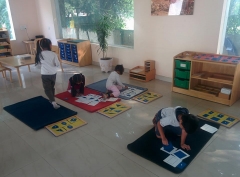 Our first meeting was cancelled. A missed act. And for a good reason! No sooner had I pushed the gate of the second school that I knew our quest would end there. Only one classroom, the children of all ages are all together. Each one does his own activities, in silence (no ‘master’ bellowing Jingle bells in the middle of July). A garden where kids can go to freely, with even a vegetable garden. No uniforms. And flexible pick and drop hours. Sold! And I am not even speaking about, ‘small’ bonus, the learning benefits of this education for children... This school makes me happy to live in Gurgaon, that says it all!
Our first meeting was cancelled. A missed act. And for a good reason! No sooner had I pushed the gate of the second school that I knew our quest would end there. Only one classroom, the children of all ages are all together. Each one does his own activities, in silence (no ‘master’ bellowing Jingle bells in the middle of July). A garden where kids can go to freely, with even a vegetable garden. No uniforms. And flexible pick and drop hours. Sold! And I am not even speaking about, ‘small’ bonus, the learning benefits of this education for children... This school makes me happy to live in Gurgaon, that says it all!
Since then, the nanny came to better feelings and Baby Samurai started school at 2 years and 9 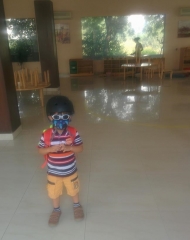 months. And everything went very well! I even got to stay a few days in the class to adapt smoothly (I mean, I got to adapt, not my son who got accustomed very quickly).
months. And everything went very well! I even got to stay a few days in the class to adapt smoothly (I mean, I got to adapt, not my son who got accustomed very quickly).
And this leaves me at least 2 years of respite, before having to dig into the selection of the next school, which is no easy task. For example, there are Indian and British curriculums. Then you must be selected and prepared to pay astronomical amounts. Education, like health, is a business in India. And not a very clean one, according to this study on corruption. And if you don’t believe me, please watch this movie, Hindi Medium, based on real events and which staged a rich family coming from a modest background who is denied entry to schools and thus pretends to be poor to integrate quotas. Super funny but frankly a little bit disturbing too...
 Because beyond the financial question, there is the pressure on the kids, this race to performance, where everyone has to be the best in class because they are millions (yes, millions, the whole middle and below classes who aspire to get out of the shit thanks to the education of their offspring) behind to get the first place – but what does it even mean first place? Happiness is being sacrificed to the altar of financial and social success. All this without neglecting the extra-curricular activities. I often wonder when do they sleep these kids? And when do they play? Or just spend time with their parents? I hardly ever see any of them at the park…
Because beyond the financial question, there is the pressure on the kids, this race to performance, where everyone has to be the best in class because they are millions (yes, millions, the whole middle and below classes who aspire to get out of the shit thanks to the education of their offspring) behind to get the first place – but what does it even mean first place? Happiness is being sacrificed to the altar of financial and social success. All this without neglecting the extra-curricular activities. I often wonder when do they sleep these kids? And when do they play? Or just spend time with their parents? I hardly ever see any of them at the park…
And then, there is also the whole problem of a lot of poor kids (84 millions as per the last census, in 2011) not having access to education for logistic or cost issues… Or to a not-so-good one…
08:00 Posted in Expatriation (in India and in other countries), Little Samourai, My stories in India | Permalink | Comments (0) | Tags: india, education, parenting, school, school system, hindi medium, corruption, montessori | ![]() Facebook | |
Facebook | |
04/24/2017
In the name of the Father, Mother-in-law and King-child: Parenting in India (seen by a Foreigner)
I was asked to talk about ‘parenting in India’. Quite a broad topic! I thought about if for several weeks, about what I have witnessed in the society I know and hoping not to write too many non-senses – which is a difficult task because in India for everything you say, the opposite is almost always true also...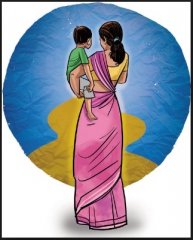
I have already written quite a lot about the experience of having a baby in India (1). In short, at the beginning, there is the mother-in-law, often present at birth, and she is often the first one to hold the newborn (before the mother this is true). Then the sister-in-law has to carry out a ritual – clean the mother’s nipples to purify them and give to the newborn a mixture made of honey (jatakarma) so he grows up all sweet with a sweet tooth – before breastfeeding can be initiated. The tone is thus set from the beginning: ‘parenting’ in India is more about ‘familying’, it is the job of about everyone in the family, if not especially the mother-in-law ( ;) ), which can upset the Western sensibility of a responsible mother who has her own views on what she wants or does not want for her child. Especially if she married to an Indian, and must comply with the rites like the naming ceremony or the head shaving (2).
The Indian son brought up, in the tradition, to never leave the family abode, his parents; in this sense he is and will always remain a ‘king boy’ all his life, kept away from any household chore – which makes guys who don’t even know not what a papaya looks like other than than in pieces on their plate, imagine. That’s the job of the women of the house: the mother, in whose petticoats he will always be hanging on except for a few misdemeanors to his wife’s, and then the latter. The Indian girl is brought up to be a good (obedient) daughter-in-law (maid) and especially a mother (she will only achieve her reason of being and earn her right to be on this Earth when she will give birth and this is apparently why we find in India the oldest primiparous women (3)); She will most likely leave her home for her husband’s and there is a good chance that she will not be able to work, even if she has done good studies (it is changing, but at a snail pace). She is taught to respect, obey, renounce being herself and especially swallow her feelings. If unfortunately a tragedy like a miscarriage happens, she is told that “there is no point crying, she should just forget and move on”. Mourning, letting her emotions flow? But this is madness! It is put a bit abruptly but it is quite like that.
Let us get back to the notion of ‘king boy’. French parents love their children, but they also try to limit the disruption their arrival means, in other words to not sacrifice their (entire) lives to their kids. For example the couple’s ‘intimacy’ is given a lot of importance and guides the sleeping organization. Which Westerner (except for the hipsters who are bringing back ‘co-sleeping’  into fashion) would not be horrified by the mere idea that children sleep with their parents? And up to 4 years at least! I remember being shocked when I could not find a child’s room (to sleep or play) in my Indian colleague’s apartment which yet had to bedrooms. In India, children not only sleep in the same bed as their parents, but also at the same time. Talk of ‘food and sleep schedule’ or ‘sleep training’ and they look at you like a monster. Here children live to the rhythm of the household from their very first few hours and immediately the world starts spinning around them. It is very cultural: the couple has very little importance in India, lost in the more comprehensive concept of family (in-laws, children, cousins, all must live in harmony, and the couple (which is anyway in general made of reason and not love) must make all the efforts to make it happen). In most Western societies, the couple is the foundation, and we even conceive that the children’s well-being could depend on the happiness of the parental couple - in our individualistic Western world, happiness comes from the realization of the self, in India by doing your duty, and ALL the difference comes from here. The latter are not ashamed to go on a holiday without their little one. And no Indian person would even think of it (also because the notion of ‘holidays’ is fairly new and is generally limited to visit the family and not to laze on a beach or hike in the mountains (unless there is a temple to see)). Indians also bring very young kids to the (adult) movies, to shows where mythological monsters scare the shit of me, or even to bars. And to conclude, in India, we don't let kids cry, it’s a sin. Some say it would be beneficial to let youngsters express their feelings, anger or sadness, but I guess it just creates too much distress for the family here.
into fashion) would not be horrified by the mere idea that children sleep with their parents? And up to 4 years at least! I remember being shocked when I could not find a child’s room (to sleep or play) in my Indian colleague’s apartment which yet had to bedrooms. In India, children not only sleep in the same bed as their parents, but also at the same time. Talk of ‘food and sleep schedule’ or ‘sleep training’ and they look at you like a monster. Here children live to the rhythm of the household from their very first few hours and immediately the world starts spinning around them. It is very cultural: the couple has very little importance in India, lost in the more comprehensive concept of family (in-laws, children, cousins, all must live in harmony, and the couple (which is anyway in general made of reason and not love) must make all the efforts to make it happen). In most Western societies, the couple is the foundation, and we even conceive that the children’s well-being could depend on the happiness of the parental couple - in our individualistic Western world, happiness comes from the realization of the self, in India by doing your duty, and ALL the difference comes from here. The latter are not ashamed to go on a holiday without their little one. And no Indian person would even think of it (also because the notion of ‘holidays’ is fairly new and is generally limited to visit the family and not to laze on a beach or hike in the mountains (unless there is a temple to see)). Indians also bring very young kids to the (adult) movies, to shows where mythological monsters scare the shit of me, or even to bars. And to conclude, in India, we don't let kids cry, it’s a sin. Some say it would be beneficial to let youngsters express their feelings, anger or sadness, but I guess it just creates too much distress for the family here.
The Indian parents smolder their young; and yet they do not really arm them to survive in this world of brutes, to become independent, an individual; individuality occupies only a very small place in the Indian family structure. Right from the beginning for instance, the newborn is a ‘thing’ that is being passed from arm to arm, he ‘belongs’ to everyone, an extension of his parents which does not really have his own personality, still less a respected one. (I always surprise people when I let my two year old choose his clothes himself.) The smoldering is more physical where the mother hyper attentive to the needs of her baby: baby that she breastfeeds very late, that she massages every day, that they are always carrying. In India we are really in a 'contact' culture versus a 'hearing' Western environment where we leave babies lying down and watching the ceiling or a mobile toy and we teach them from a very early age to 'not be too attached' because the separation is going to come very soon. So in India the mother is so close to her child that she can even predict from a very early age to detect when he is going to shit and manage to potty-train him almost before his sphincters are sufficiently developed. A method consists in walking behind the kid with a newspaper, and slide it under the buttocks as soon as you can spot the signs of an imminent defecation. If you are not fast enough, you can then use the same paper to pick with the trophy. A complementary technique offers to let the baby hang around without diapers, playing in the sand pit and let his pee dry when it flows into the pants – I find it risky winter but how am I to talk potty-training? – apparently children learn fast in these cases. (And the economy of diapers relieves everybody: the wallet and the planet.)
When French mothers go to the park, they usually sit on a bench chatting while their small ones play around; and I find it fascinating. Indian mothers, if they were going to the park instead of sending the nanny, would spend their time running behind their kid. A bit like me so. But the height of it was when the Director of a babystore chain praised me the merits of an innovation that should be a big hit in India: a helmet to protect the back of the head when toddlers fall, because “you have no idea the number of mothers who spend their day running behind their offspring with a pillow so that they don’t let them hurt themselves when learning how to walk!” If that's not the summum of smoldering, I don’t know what is... (that being said I have personally never witnessed this kind of behavior).
And the food! The sinews of war, you will tell me. Feeding a child in France seems simple enough: he sits at the table, if he eats, all well, if he doesn’t eat, all well, he will get the same stuff at dinner. Feeding a child in India is just the opposite: parents and grand-parents spend their day putting who a piece of chapati, who a sugar cube, in the mouth of the small one, usually busy with other things. No wonder that Indian adults are the champions of snacking (and they often munch on fat fried stuff)! And then, at each visit, the first comments are usually on the weight of the child – knowing that in general the bigger better, where “chubby”" means “healthy”.
In a nutshell this is what the ‘king boy’ is: a kid that we don’t let cry, who is fed all the time.  Except that the king child gets a reality check pretty fast and it’s even harder as he was not prepared for it during his tender years. For example, when I told the story of my son calling his father by his first name for the first time, which I found very cute and funny, I was explained that at 2 it makes everyone laugh and at 5 he would get slapped for it. Indians seem to have a pretty heavy hand, slaps come easy and even teachers do not go at it with the back of the spoon – just like France a few decades ago. One must also highlights that in India, the ‘respect’ for elders is sacred. The king child is not God! It is therefore not a good idea to question one’s parents, worst to disobey them - so for a French who is used to question everything and everybody all the time, it is pretty hard to understand. The dialogue parents-children is sometimes difficult, in addition to the fact that certain topics are completely taboo, such as sexuality (and its abuses), alcohol, drugs etc. In short a lot of crucial discussions are avoided, because “we don’t talk about these things here”.It is also quite interesting to observe that living all together doesn't necessarily means communicating more or better, and it is quite the opposite actually. It is also compelling to see that Indians, who are by the way very emotional people, don't express much their feelings, and you often have to read between the lines. For instance, most Indian languages have no real word to express love, the love of a parent, a child, or even a partner. According to somebody close to me, love is expressed in India not by words but by actions, like "preparing somebody's favorite dish". And here we go, back to food, it’s crazy! (I could have argued said that in Europe one must use words AND gestures – it is a hard job ‘keeping love alive’.) In short in India we don’t say I love you and we don’t live crazy love stories, and that’s probably why people love a good marshmallow Bollywood movie: it sells them some dream (or rather fantasy)!
Except that the king child gets a reality check pretty fast and it’s even harder as he was not prepared for it during his tender years. For example, when I told the story of my son calling his father by his first name for the first time, which I found very cute and funny, I was explained that at 2 it makes everyone laugh and at 5 he would get slapped for it. Indians seem to have a pretty heavy hand, slaps come easy and even teachers do not go at it with the back of the spoon – just like France a few decades ago. One must also highlights that in India, the ‘respect’ for elders is sacred. The king child is not God! It is therefore not a good idea to question one’s parents, worst to disobey them - so for a French who is used to question everything and everybody all the time, it is pretty hard to understand. The dialogue parents-children is sometimes difficult, in addition to the fact that certain topics are completely taboo, such as sexuality (and its abuses), alcohol, drugs etc. In short a lot of crucial discussions are avoided, because “we don’t talk about these things here”.It is also quite interesting to observe that living all together doesn't necessarily means communicating more or better, and it is quite the opposite actually. It is also compelling to see that Indians, who are by the way very emotional people, don't express much their feelings, and you often have to read between the lines. For instance, most Indian languages have no real word to express love, the love of a parent, a child, or even a partner. According to somebody close to me, love is expressed in India not by words but by actions, like "preparing somebody's favorite dish". And here we go, back to food, it’s crazy! (I could have argued said that in Europe one must use words AND gestures – it is a hard job ‘keeping love alive’.) In short in India we don’t say I love you and we don’t live crazy love stories, and that’s probably why people love a good marshmallow Bollywood movie: it sells them some dream (or rather fantasy)!
It is mostly when school starts that children start realizing that life is no piece of cake. It can therefore begin early. In Europe we had to develop creches so that mothers could work and we ended up putting oursevelves some balm on the heart by convincing ourseveles that it is actually a choice, and it’s better for the children not to be at home from a young age – which I don’t believe to be entirely true. So in India, despite the fact that many mothers stay at home, surrounded by her in-laws and supported by the nanny, more and more hurry to put their offspring early in (pre)school,  “so that they develop grows faster”. An explanation that makes me jump every time, a systematic response when I ask why a mother who insists that I send my son since he turned 12 months to school. But why on earth do people always want to go faster than the music? Especially since once they are in the system, children face incredible pressure because competition is fierce and the seats are expensive: there are many young people and a huge poor class ready to fight to get out of the shit (they represent 70% of the population), not enough good institutions and quotas for lower castes, no unemployment insurance, no retirement scheme etc. In short, if you are not hungry enough to fight for survival, you're dead (unless your parents are super rich). Education is therefore a business, an ‘investment’ for which returns are clearly expected and which does not stop at the school which can cost a fortune: kids spend almost as much time (and parents spend almost as much money) in tuition! And the new trend is the extra-curricular activities: youngsters must be the best in class, and at playing tennis and the guitar. Not much respite for them.
“so that they develop grows faster”. An explanation that makes me jump every time, a systematic response when I ask why a mother who insists that I send my son since he turned 12 months to school. But why on earth do people always want to go faster than the music? Especially since once they are in the system, children face incredible pressure because competition is fierce and the seats are expensive: there are many young people and a huge poor class ready to fight to get out of the shit (they represent 70% of the population), not enough good institutions and quotas for lower castes, no unemployment insurance, no retirement scheme etc. In short, if you are not hungry enough to fight for survival, you're dead (unless your parents are super rich). Education is therefore a business, an ‘investment’ for which returns are clearly expected and which does not stop at the school which can cost a fortune: kids spend almost as much time (and parents spend almost as much money) in tuition! And the new trend is the extra-curricular activities: youngsters must be the best in class, and at playing tennis and the guitar. Not much respite for them.
In short, each parent gives their best at parenting don’t they? But in modern India, where society is changing fast and they have been integrating many Western concepts in conflict with a system of hard skinned traditions and values, it is easy to get lost when you try and bring up a child!
(1) http://www.indiandacoit.com/list/my-docs-about-india/babi... and http://www.indiandacoit.com/list/my-docs-about-india/baby-samourai-made-in-india.html
(2) http://www.bbc.co.uk/religion/religions/hinduism/ritesrituals/baby.shtml
(3) http://www.dailymail.co.uk/health/article-3582592/Indian-woman-70-gives-birth-baby.html
08:00 Posted in Expatriation (in India and in other countries), Little Samourai, Why in India... | Permalink | Comments (0) | Tags: india, parenting, education, upbringing, raising up children in india, society, respect, taboo, pressure | ![]() Facebook | |
Facebook | |
10/12/2015
Sleep baby sleep... (Sleeping in India and in France)
A friend (Indian) came home unexpectedly on Saturday night at 9 PM. When he ‘complained’ about Baby Samurai not being available for play, I explained that he had been sleeping for an hour already. To which he answered: “Are you German or what, that he needs to have a schedule?” That says it all…
Sleep is one of the largest cultural differences between India and France, according to me. 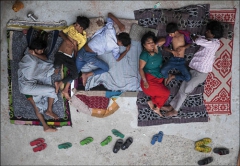 For example, an Indian can easily talk to you while you are asleep, or clean your room, or even bring you a chai. And nobody would think of closing the door of the bedroom when starting a movie full volume in the room next door. The few times I allowed myself to sleep late, like until 11, my favorite Indian was all over the place, and came and disturbed me several times...
For example, an Indian can easily talk to you while you are asleep, or clean your room, or even bring you a chai. And nobody would think of closing the door of the bedroom when starting a movie full volume in the room next door. The few times I allowed myself to sleep late, like until 11, my favorite Indian was all over the place, and came and disturbed me several times...
It must be linked to the living conditions: as many people live in very small spaces, no one can afford the luxury of a beautiful uninterrupted nap, or in silence (to be fair, it is better they learn from an early age to sleep through the noise in India, it is quite a matter of survival). In India people sleep because they have to, they do not indulge in the comfort of resting. However it is a little less true regarding food, yet another physiological need.
The same goes with babies (1). They follow the rhythm of the household. Even worse: If parents work a lot, it is not uncommon that a baby stays awake till past midnight in order to spend some time playing with his father.
In India, the child sleeps with his mother. And therefore, theoretically, with his father. Unless the latter doesn’t want to be woken up (by the baby’s cries or kicks), in which case he will go sleep wherever he can (on the floor, on a mattress, in another bed or on the couch). I know a lot of such cases. About the couple intimacy? Well, even before there is a baby, it is already quite an unusual concept (once again probably because of the ‘sardines’ way of life and also of the arranged marriage). And even if it was, the baby comes first. And he must sleep with his mother, to be able to suckle ad libitum and to ‘create bonds of love’. In such a context, the baby doesn't need to learn to fall asleep by himself nor to go back to sleep on his own; and they don’t let him cry more than two seconds. The baby is King in India, at least the first two-three years (after that it becomes less funny, with a strong reality check for what is coming ahead).
That mothers end up exhausted from continuously waking up from kicks or a greedy suckling mouth, nobody cares (at least after the first 3 months where they are well looked after by their mothers, so that they recover well from the physical hardship that giving birth is).
You have guessed, I was one of these wron-out mothers, since Baby Samurai had decided that sleeping at night was good for fools, the day he turned 4 months. well he was sleeping, but would wake up every two hours (at best). In addition we traveled quite a lot, and he often slept in our bed. At 5 months I did try the Tracey Hogg method to teach him to fall asleep by himself, but I was already too weak from sleep deprivation to withstand an hour of crying and I decided that 1. He was too small, 2. Westerners were a little too harsh in the way they (we) educate the babies, 3. The French are quite cold-hearted to leave a newborn alone in his bed in his room the first night itself.
And there I became sleep deprived, crazed. Not depressed, but a real zombie. My goal every day was to pull the wool over my colleagues’ eyes (and master the technique of sleeping with eyes open). I must say that in addition to micro-nights, I had to deal with breastfeeding. And breastfeeding is good, but it is not always easy: it takes of lot energy, when he feeds, and even more so when you have to express milk. I had therefore abandoned the idea that baby Samurai (and I at the same time) would one day sleep an entire night, at least not before he would leave home...
And then, one evening, a friend of mine, a French girl married to an Indian man, sent me a document to “Sleep train babies" (SleepSenseTraining (website) that she intended to try.) I explained to her that personally I had given up and I expected things to settle by themselves. But then, out of curiosity and because I had nothing else to do and I had my phone in hand, I opened the book. 45 minutes later, Baby Samurai woke up and I decided to test this technique illico presto. Just like somebody drowning clings on to a lifeline. The last chance! After crying for 45 minutes, he was sleeping soundly. And in a week’s time (with ups and downs) he was sleeping almost all through the night, more than 10 hours. I would have been told it was possible, I would have not believed it!
This being said, I did things my way. And some may argue that I am taking the best of each culture, but really, I'm just following my instincts. So we follow a bedtime routine which includes a massage, he goes to bed at 8 PM and he sleeps in his crib. On the other hand he sleeps in our room and I don't insist he falls asleep without anybody in the room; I will continue to take him in my arms to calm him down if he needs and I am a little flexible regarding the naps. I was also comforted in my approach by the little I have read about Hélène Stork’s work about ‘compared practices of mothering in the West and in other countries, including South India’ and I just ordered her book (2).
In any case, Baby Samurai sleeps and I feel alive again – in fact I'm almost tired of sleeping too much but I shall not complain shall I??
(1) Summary of the differences in mothering:
Source:https://www.Cairn.info/Revue-spirale-2005-2-page-151.htm
(2) Hélène Stork, Indian childhoods. Study and comparison of cross-cultural psychology of the young child, Paris, Paidós / Centurion, 1986
Providing medical and psychological consultation in Paris suburbs, Hélène Stork found many psychological disorders in young children. Following her strong intuition that these difficulties were representative, among others, of the malaise of an entire society, she compared the practices of mothering in the West with those of other countries, including South India (Tamil Nadu), where she stayed at length, on several occasions. Like the Ethnologist, she led extensive clinical research on the field, along with studies of ancient Sanskrit texts underlying the Indian techniques of infant care. This book, after defining cross-cultural psychology (history, methods, goals), describes with great precision (thanks, in particular, to the filmic investigation) gestures and postures of mothering in South India, bringing a rich contribution to the study of the psychic life of babies during the first six months. At the end of his work, Hélène Stork formulates a question for the West: “Does the social organization of the family allows women (parents) to practice a mothering helping in the sensory-motor development and good mental health of the child?”
08:00 Posted in Expatriation (in India and in other countries), Incredible India!, Little Samourai, My stories in India | Permalink | Comments (0) | Tags: india, sleep, hélène stork, education, baby sleep, sleep training, tracey hogg | ![]() Facebook | |
Facebook | |















